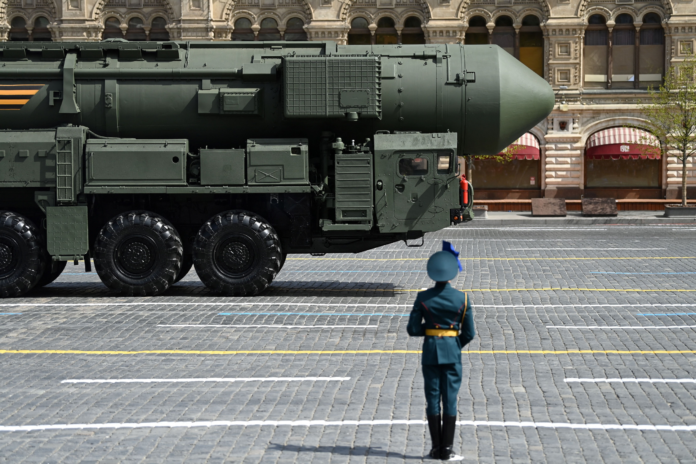Russia has enough missile supplies left for only two or three more of the mass strikes it has launched in recent months against Ukrainian cities and energy infrastructure, according to Ukrainian intelligence.
Vadym Skibitsky, the deputy head of Ukrainian military intelligence, told RBC-Ukraine in an interview published on Wednesday that Russia’s supplies of high-precision missiles, including Kh-101, Kh-555 and Kalibr missiles, are running low.
“When we talk about the possibility of two to three strikes, we mean that there will be approximately 80 missiles [used] during [an] attack, and maybe more,” he explained.
“For example, on December 31, [Russia] used only 20 cruise missiles, although before that they used about 70 or even more. Therefore, when we speak of two to three strikes, we mean a massive attack.”
Russia has for months been bombarding Ukraine with strikes on its energy infrastructure, causing blackouts across the country.
In November, as Russia pummeled Ukraine with a wave of missile strikes on cities including the capital Kyiv, Dnipro and the Odesa and Kharkiv oblasts, Ukraine shot down a Russian cruise missile over Kyiv that was reportedly equipped with a mock nuclear warhead.
A Kh-55 cruise missile that had a block “screwed” on that acted as a simulator of a nuclear warhead was shot down, Ukrainian news outlet Defense Express reported, noting that the Kh-55 is a Soviet missile that was originally developed specifically as a carrier of nuclear weapons and that conventional and nuclear warheads differ structurally.
Russia may have used Soviet-era missiles because its cruise missile inventory is running critically low, according to Defense Express.
The Kh-555, which Skibitsky said Russia is now running out of, is a conventional version of the Kh-55, and was accepted for service in 2004. Compared to the Kh-55, it has improved accuracy and increased range.
Cruise Missiles
The Kalibr cruise missiles, first introduced in 1994, are one of Russia’s primary long-range weapons. They have been used against Ukrainian military and infrastructure targets throughout the conflict.
The Kh-101 is a cruise missile carried by strategic bombers and launched in the air. Last month, Ukraine’s Air Force Command said Russia had launched at least 76 missiles, including the Kh-101 missiles (ALCMs) as part of a barrage of strikes against Ukraine’s energy infrastructure.
Oleksiy Danilov, secretary of Ukraine’s National Security and Defense Council, told Bloomberg last month that Russia is running low on firepower.
“We understand how much they’ve expended so far — we understand that they don’t have so many,” he said, adding that Ukraine is “becoming mightier in air defense” as Russia’s stockpile depletes.
And in October, Ukrainian Defense Minister Oleksii Reznikov also suggested that Russia’s missile stockpile was dwindling.
“By using hundreds of high-precision missiles against civilian objects of Ukraine, the aggressor state reduces its ability to strike the military targets,” he wrote on Twitter.
Both Russia and Ukraine have been losing a significant amount of equipment since the war began, but Russia has been hardest hit in the conflict, according to estimates by the website Oryx, which has been tracking equipment losses throughout.
So far, Russia has lost roughly 8,590 pieces of equipment, compared to Ukraine losing some 2,699 pieces of equipment, estimates show.
Skibitsky said that according to Ukrainian estimates, Russia is able to produce approximately 30 units of Kh-101 a month, and 15 to 20 units of Kalibr per month.
“In general, according to regulatory documents, the strategic stockpile should be 30 percent of the entire stockpile of missiles. But they have already been using the reserve of all types of missiles: Iskander, Kalibr, Kh-101, Kh-555. That is, they already have less than 30 percent of reserves.”
He added: “This shows that it is really a problematic issue for them to replenish their reserves.”
Newsweek has contacted Russia’s foreign ministry for comment.
Do you have a tip on a world news story that Newsweek should be covering? Do you have a question about the Russia-Ukraine war? Let us know via worldnews@newsweek.com.




